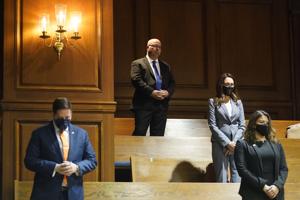Indiana lawmakers call for commission on election integrity

(The Center Square) – Two Indiana legislators have introduced a bill calling for the formation of a Commission on Election Integrity that would review the security of all voting machines used in the state and consider whether election laws should be changed to increase confidence in the vote.
Reps. Curt Nisly, R-Milford, and John Jacob, R-Indianapolis, introduced the bill in the Indiana House of Representatives to form a nine-person bipartisan commission to make recommendations dealing with voting machines, the handling of voter data, voter rolls and relationships between election officials and voting machine vendors.
The commission would be tasked with finding outside experts to assess the security of all voting machines and also look at whether absentee voting laws should be tightened, with fewer reasons for voting absentee allowed and early voting possibly curbed.
Other provisions of the bill include having the commission look at requiring that any absentee, provisional and military ballots that are not counted in the presence of observers from both political parties and all candidates be excluded from vote totals, and requiring that counties do risk-limiting audits before certification of an election, with paper ballots hand-counted in at least 10% of precincts, as a check against the machine totals.
Unlike some other states, Indiana doesn’t currently require risk-limiting audits. County clerks may order hand recounts when questions arise, but in most elections they rely solely on machine tallies.
Voting systems certified for use in the state include those made by: Dominion, ES&S, Hart InterCivic, MicroVote and Unisyn.
The machines are tested and recommended for certification by VSTOP, the Voting Systems Technical Oversight Program at Ball State University, run by a computer science professor and a criminal justice professor.
In hearings before state legislative committees over the last two months in Pennsylvania, Michigan, Wisconsin, Arizona and Georgia, cybersecurity experts revealed that many voting machines used in the 2020 election were connected to the Internet and therefor vulnerable to attack – contradicting what election officials nationwide had long been told and had averred, that machines were not connected to the Internet and therefore could not be hacked.
The voting machine companies have also come under scrutiny since the 2020 election, with Dominion machines shown to have high error rates, allowing for manipulation of the vote by election workers.
The Nisly-Jacobs bill would ask the Commission on Election Integrity to consider “forbidding voting machines from containing modems” and “forbidding the use of voting machines that contain any parts made outside the United States” as well as forbidding the use of voting systems that use software developers or operators who are located outside of the United States and making companies disclose all equity owners.
The bill also deals with the voter registration system, asking the commission to consider requiring “specific measures” to be taken every two weeks or every month to maintain voter rolls in the state, including checks against death records, driver’s license records and the USPS National Change of Address Service and requiring names be removed from rolls after an attempt is made to reach a registrant with no response.
The nine-member commission would include Indiana’s secretary of state, who would serve as the commission’s chair; two people recommended by the chairman of the state Republican Party and two people recommended by the chairman of the Democratic Party; and four other people who are not affiliated with a major political party.
It would meet once a month, and would submit a report of its work, including recommendations for any laws to be enacted or amended, by July 1, 2022. The vote of at least six members of the commission would be required to sign off on the report.
Indiana wasn’t a focus of the 2020 election disputes, but the state has seen several major incidents of election fraud and violation of election laws in recent years, including in the Evansville area in 2020, where a Vanderburgh County Democratic Party precinct committeewoman named Janet Reed was facing a felony charge for illegally altering more than 400 absentee ballot applications.
In 2016, a dark money nonprofit organization called Patriot Majority USA was busted for submitting thousands of fraudulent voter registrations in more than 50 counties in the state. In 2008, several Democratic officials in northern Indiana were prosecuted for approving hundreds of fake signatures on ballot petitions to get Hillary Clinton and Barack Obama on the ballot in Indiana. The chairman of the St. Joseph County Democratic Party was tried, convicted and sentenced to a year in prison, with other Democratic operatives receiving probation.
The Nisly-Jacob bill to form the Election Integrity Commission has been assigned to the Commission on Elections and Apportionment.
Disclaimer: This content is distributed by The Center Square

